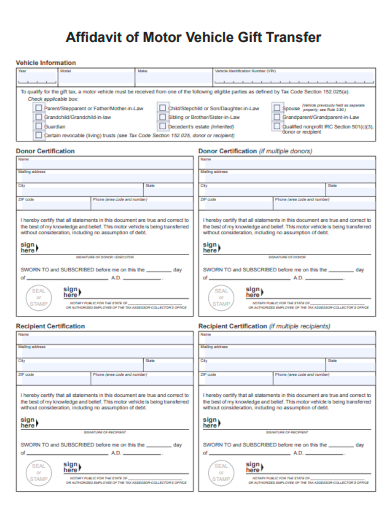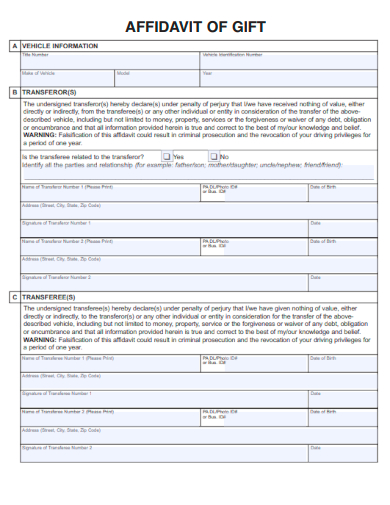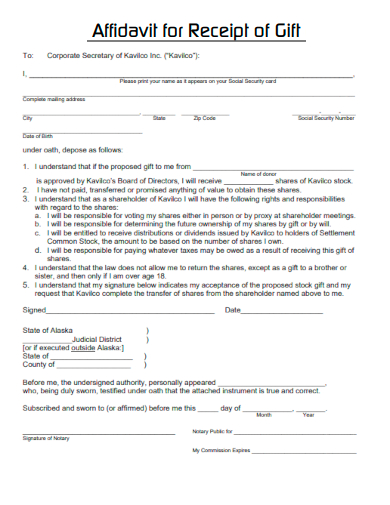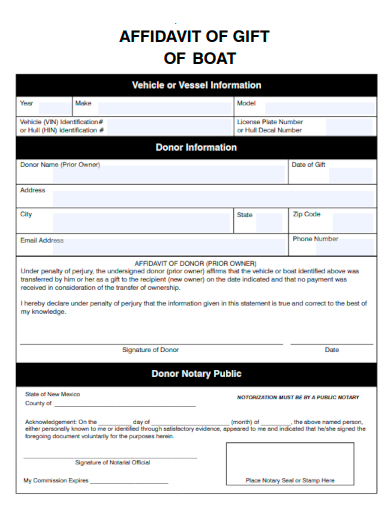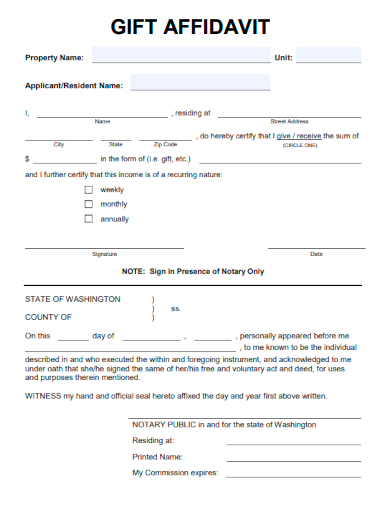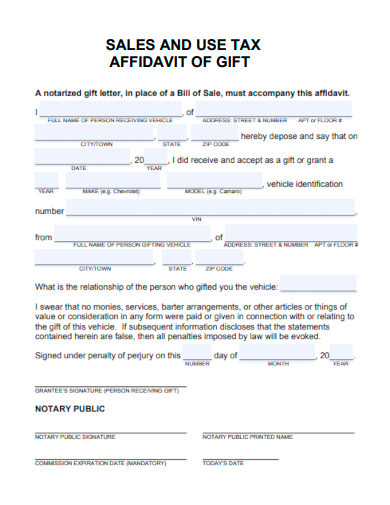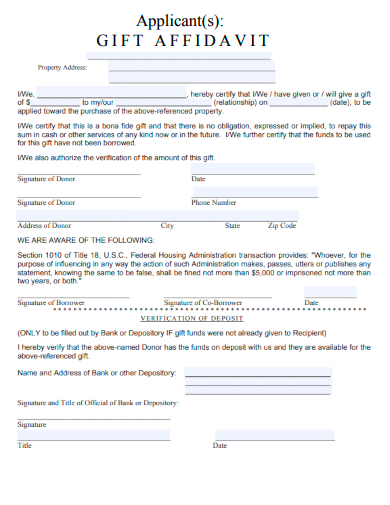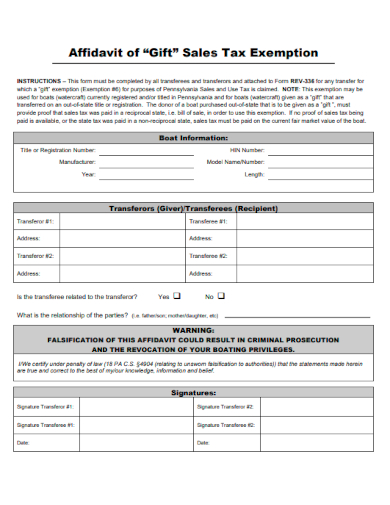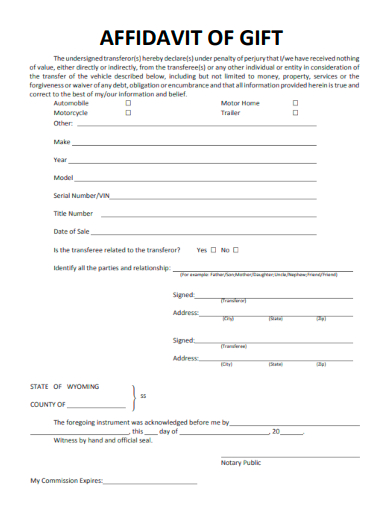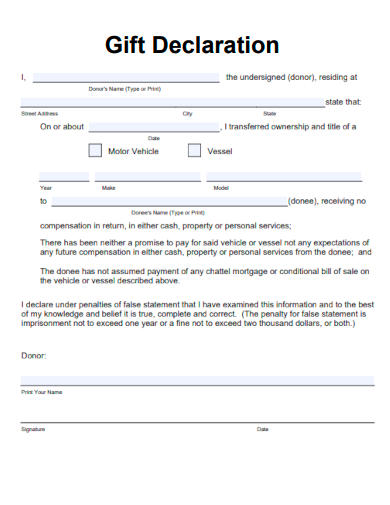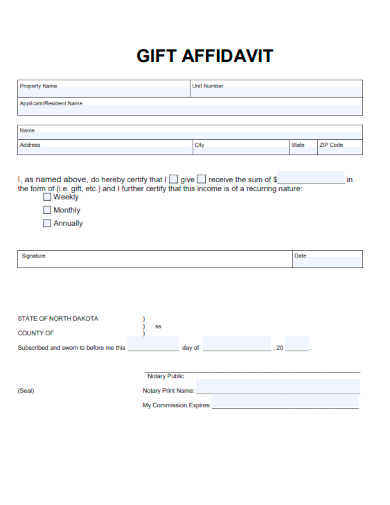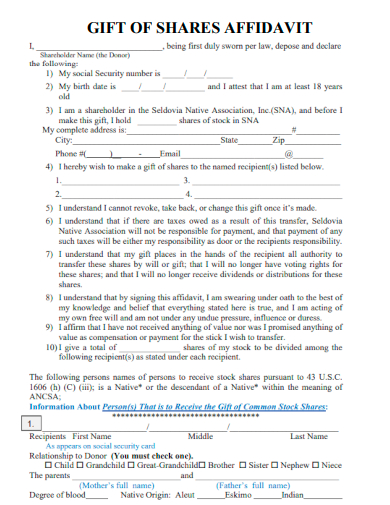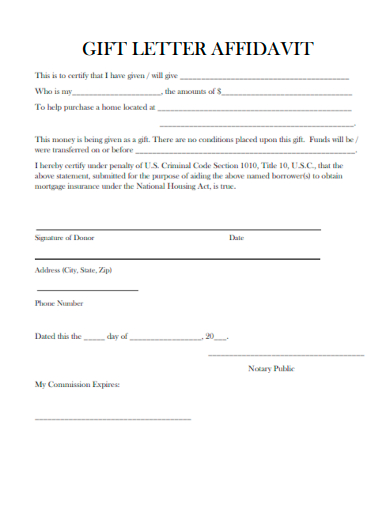Gifting is an act of love and generosity, but there are moments when a written statement is vital to affirm these actions. A Gift Affidavit not only captures the essence of your gesture but also serves as a concrete statement of no expected repayment. Whether it’s a significant sum of money, a property deed, or a cherished heirloom, our Sample Gift Affidavit Template ensures your act of kindness is both recognized and legally validated. Explore this template to fortify your heartfelt gifts with a solid statement.
FREE 15+ Gift Affidavit Samples
1. Gift Transfer Affidavit Template

2. Affidavit of Gift Template
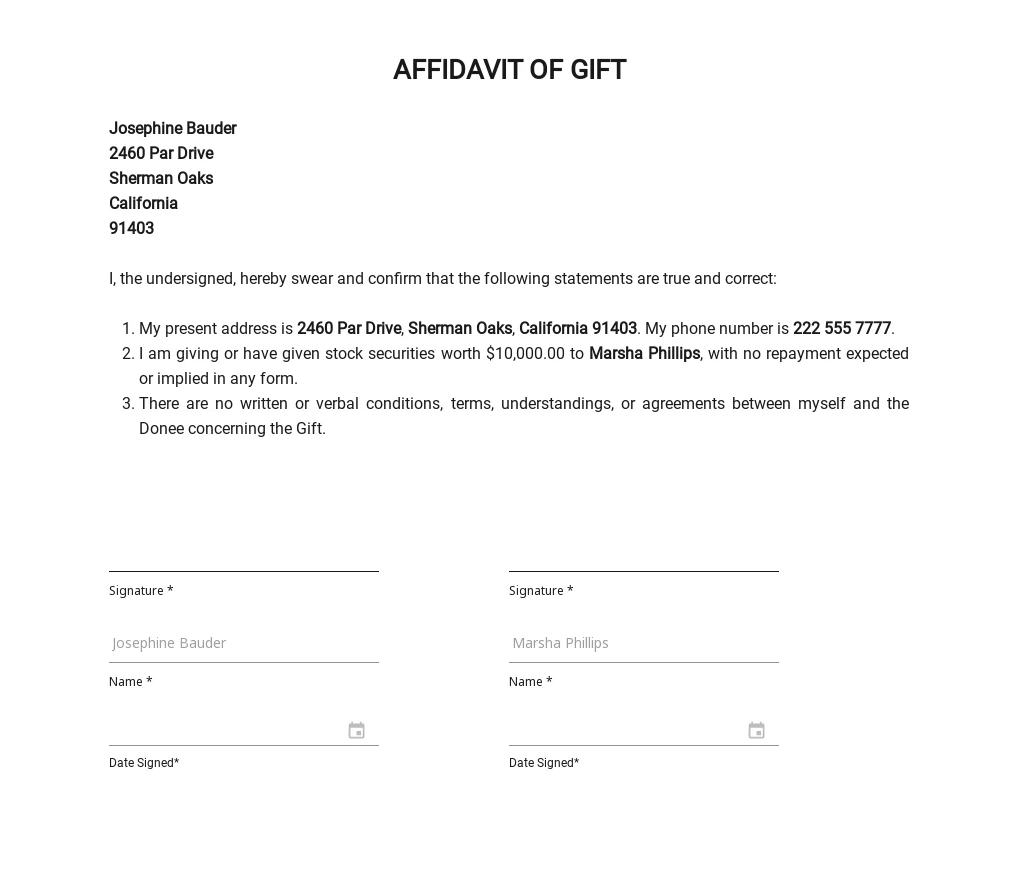
3. Sample Gift Transfer Affidavit Template
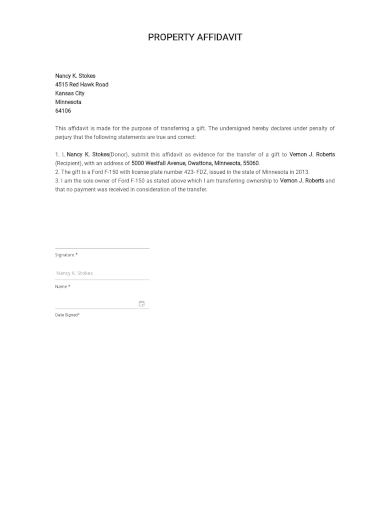
4. Sample Affidavit of Motor Vehicle Gift Transfer Template
What is a Gift Affidavit?
A Gift Affidavit is a legal document that formally records the voluntary transfer of a gift from one person (the donor or giver) to another (the recipient or donor), without any payment or consideration in return. This affidavit is a sworn statement, usually in writing, that confirms the donor’s intention to make the gift and asserts that there is no hidden obligation for the recipient to repay or return the gift in the future.
Importance of a Gift Affidavit
Legal Clarity: In the realm of legal transactions, clarity is paramount. A Gift Affidavit serves to provide crystal-clear evidence that an item or sum of money was indeed given as a gift. This is especially important if the gift’s value is substantial, like real estate or a significant amount of money.
Tax Implications: In many jurisdictions, gifts that exceed a certain value might be subject to taxes. By providing a Gift Affidavit, the donor can confirm the nature of the transfer, which may assist in determining any tax liability or potential exemptions.
Protection against Future Claims: There might be situations where the legitimacy of a gift is challenged, perhaps by other family members after a donor’s death. In such cases, a Gift Affidavit acts as a shield, demonstrating the donor’s genuine intention at the time of the gift.
Common Elements of a Gift Affidavit
While the format and specific content of a Gift Affidavit can vary based on jurisdiction and the nature of the gift, most gift affidavits will include the following:
Names and Details: The full names and contact details of both the donor and the recipient.
Description of the Gift: A detailed description of the gift, be it money, property, or any other item. For tangible assets, this might include serial numbers, property descriptions, or any other identifying features.
Statement of Volition: A clear declaration that the gift is being given out of the donor’s own free will, without any coercion or undue influence.
No Expectation of Repayment: A statement clarifying that there is no expectation or obligation for the gift to be returned or repaid.
Date of Transfer: The specific date when the gift was or will be handed over.
Witnesses and Notarization: Depending on the jurisdiction, the Gift Affidavit might require the signatures of witnesses or even notarization to enhance its legal weight.
When is a Gift Affidavit Necessary?
While smaller, personal gifts typically don’t require such documentation, it’s advisable to use a Gift Affidavit in the following scenarios:
High-Value Gifts: Any gift of significant monetary value, such as real estate, vehicles, or large sums of money.
For Tax Purposes: When a gift might have potential tax implications, either for the donor or the recipient.
Avoiding Potential Disputes: In families or among parties where there might be a potential for disputes or disagreements over property or assets in the future.
A Gift Affidavit is an invaluable tool in the world of legal transactions pertaining to gifts. It brings clarity, authenticity, and peace of mind to both the giver and the recipient, ensuring that the act of giving remains untarnished by potential future complications or disputes. Whether you’re gifting a piece of jewelry or a piece of land, a Gift Affidavit stands as a testament to your genuine intentions.
5. Sample Gift Affidavit Basic Template
6. Sample Affidavit for Receipt of Gift Template
7. Sample Gift Affidavit of Boat Template
8. Sample Gift Affidavit Blank Template
9. Sample Sales and Use Tax Gift Affidavit Template
How To Write a Gift Affidavit?
A Gift Affidavit is a legal declaration, verifying that an item was given to another individual without expectation of payment or reimbursement. Given its legal significance, it’s crucial to ensure that the document is clear, concise, and comprehensive. Below is a detailed guide on crafting a Gift Affidavit.
Document Heading:
Always start with a clear heading or title, preferably in bold. Gift Affidavit is direct and serves the purpose.
Particulars of Involved Parties:
Donor Information: Begin by stating the full legal name of the person giving the gift, followed by their complete address, contact number, and any other relevant details.
Recipient Information: Similarly, detail the name, address, and other particulars of the recipient or the donee.
Detailed Description of the Gift:
It’s vital that the gift’s description leaves no room for ambiguity. If it’s a physical object, describe its nature, make, model, color, size, serial number, or any other pertinent identifying feature. For monetary gifts, mention the exact amount both numerically and in words.
Statement of Voluntary Giving:
This section solidifies the intent behind the gifting. A typical declaration might read: “I, [Donor’s Full Name], willingly and voluntarily present [Detailed Description of the Gift] to [Recipient’s Full Name], without any conditions or expectations of reimbursement.”
Date of Transfer:
It’s imperative to specify when the gift was handed over or will be given. This could be particularly important for tax purposes or if there are any disputes about the gift in the future.
Oath and Jurat:
This section is where the donor swears to the truthfulness of the affidavit. It typically reads something like: “I, [Donor’s Full Name], under penalty of perjury, solemnly affirm that the statements above are accurate to the best of my knowledge.”
Signatures:
Donor and Recipient Signatures: Both the giver and the recipient should sign the affidavit, thereby endorsing the information and statements made within.
Witnesses: Depending on the jurisdiction or the gravity of the gift, you might require one or more witnesses to be present during the signing. They should provide their signatures, names, and addresses.
Notarization:
Many regions require legal documents, especially those of significant importance, to be notarized. If this is the case, leave space at the bottom for a notary public to sign and stamp the document. They will confirm the identities of the signing parties, ensuring the process’s integrity.
Review and Legal Consultation:
Before finalizing the Gift Affidavit, it’s a wise practice to review it thoroughly for accuracy and completeness. Check for typographical errors, ensure all required fields are filled, and, if possible, consult with a legal expert to ensure the document meets all necessary standards and requirements.
Multiple Copies:
Make several copies of the finalized and signed affidavit. Both the donor and the recipient should retain copies for their records, and additional copies might be required for legal or tax-related purposes.
While a Gift Affidavit might seem like a simple document, its role in certifying the genuineness of a gift transaction is invaluable. It’s more than just a piece of paper; it’s a testament to the transparency and authenticity of an act of giving. When written correctly and comprehensively, it can prevent potential misunderstandings or legal disputes down the line.
10. Sample Applicant Gift Affidavit Template
11. Sample Affidavit of Gift Sales Tax Exemption Template
12. Sample Gift Affidavit Standard Template
13. Sample Gift Declaration Affidavit Template
When To Use a Gift Affidavit?
The act of gifting, whether it’s a cherished heirloom or a substantial monetary gift, often goes beyond just the exchange of items. In many situations, legal clarity becomes essential, ensuring that the intent behind the gift remains unambiguous and protected. This is where a Gift Affidavit comes into play. But when should one consider using such a document? Let’s delve deeper into the scenarios that warrant the use of a Gift Affidavit.
High-Value Gifts:
Whenever the gift in question carries a significant monetary value, such as real estate, vehicles, or large amounts of money, a Gift Affidavit becomes crucial. The document serves as concrete proof that the item or money was indeed given without any strings attached and is not a loan in disguise.
Gifts That May Incur Taxes:
Many jurisdictions have tax implications for gifts that exceed a certain monetary threshold. A Gift Affidavit can assist both the giver and the recipient in such cases. It verifies the nature of the transaction and can be used when filing taxes, helping determine if any gift tax is owed or if there are potential exemptions available.
Avoiding Family Disputes:
Family dynamics can sometimes be complicated, especially when significant assets or inheritances are involved. By using a Gift Affidavit, the donor can clearly establish their intention behind gifting a particular item, thereby preemptively addressing any potential disputes or challenges from other family members in the future.
Gifts Between Non-Immediate Family Members or Friends:
While close family members might not always require legal documentation for gifts, when assets change hands between friends, distant relatives, or acquaintances, the legitimacy of the transaction might come under scrutiny. A Gift Affidavit can act as a safeguard, reinforcing the authenticity of the gift.
Legal and Financial Scrutiny:
Should the recipient find themselves in a situation where their financial records are under scrutiny (for instance, during loan applications or legal disputes), large deposits or asset acquisitions might raise eyebrows. A Gift Affidavit can provide clarity, assuring concerned parties that the gift is genuine and not an undisclosed debt or liability.
Gifting to Minors:
When gifting assets to minors, it’s always a good practice to have a Gift Affidavit. This ensures that the intentions of the donor are clear and that the asset is indeed intended for the minor’s benefit.
Regulatory Compliance:
Certain jurisdictions or specific assets might have regulations mandating the use of a Gift Affidavit. For instance, transferring the title of a vehicle as a gift might necessitate an affidavit to clarify that the transfer isn’t a sale and, therefore, isn’t subject to sales tax.
Peace of Mind:
Sometimes, the primary reason to use a Gift Affidavit isn’t about legal protection but about peace of mind. Knowing there’s a written, legally binding record of the gift can offer comfort to both parties, ensuring transparency and mutual understanding.
In essence, a Gift Affidavit is a testament to the pure intentions behind the act of gifting. While not every gift may require such documentation, it’s always beneficial to err on the side of caution, especially when significant assets are involved. By utilizing a Gift Affidavit in the appropriate scenarios, both the donor and recipient can enjoy the gift exchange’s emotional and practical aspects without any lingering uncertainties.
14. Sample Gift Affidavit Form Template
15. Sample Gift of Shares Affidavit Template
16. Sample Gift Letter Affidavit Template
What Should Be Included in a Gift Affidavit?
A Gift Affidavit serves as a formal, written testament that an item or amount of money has been given as a gift, without any expectations of repayment. Given its legal significance, it’s paramount to ensure that this document is comprehensive and clear. Here’s a detailed breakdown of the elements that should be incorporated into a Gift Affidavit:
Title of the Document:
At the very top, the document should clearly be labeled as a “Gift Affidavit” to immediately establish its purpose.
Introduction of the Parties Involved:
Donor’s Identification: This should include the full legal name of the person offering the gift, their complete residential address, date of birth, and possibly other identification details.
Recipient’s Identification: Similarly, include the full name, address, and other relevant details of the individual receiving the gift.
Description of the Gifted Item:
The gift itself should be described in comprehensive detail. If it’s a tangible object, specifics such as its make, model, color, size, serial number, or any other identifying attributes should be mentioned. For monetary gifts, the exact amount should be specified, both in numbers and written out in words.
Statement of No Compensation:
This section is vital. The donor must clearly state that the gift has been given out of their own volition, without any expectation of compensation or return from the recipient. This clause ensures that the essence of the gift remains non-transactional.
Date of Transfer:
Clearly indicate the date on which the gift was handed over. This date can be important for various reasons, including tax considerations.
Oath of Truthfulness:
This is where the donor affirms the veracity of the information provided. A typical statement might read: “I, [Donor’s Full Name], hereby declare under penalty of perjury that the above information is true and accurate to the best of my knowledge.”
Governing Law:
It’s sometimes beneficial to mention the jurisdiction or state laws that apply to the affidavit. This helps in situations where legal disputes might arise, ensuring the document is assessed under the specified legal framework.
Signatures:
Donor’s Signature: The person giving the gift must sign the affidavit, thereby confirming the authenticity of the information and the intent behind the gift.
Recipient’s Signature: While not always mandatory, it’s a good practice to have the recipient also sign, acknowledging the receipt and acceptance of the gift.
Witness and Notarization:
Depending on the jurisdiction and the significance of the gift:
Witness Details: The signature(s) of one or more witnesses may be needed. They affirm that they observed the signing and that the parties are who they claim to be.
Notary Public Seal: In many cases, especially for high-value gifts, the affidavit may need to be notarized, adding an extra layer of authenticity.
Additional Clauses (if necessary):
Depending on the nature of the gift or specific circumstances, other clauses might be needed. For instance, if the gift is conditional upon a future event (e.g., a parent gifting a car to a child upon graduation), this condition should be clearly laid out.
In essence, a Gift Affidavit should be a transparent, thorough document that leaves no room for ambiguity. By including all the aforementioned components, one can ensure that the spirit and specifics of the gifting process are preserved, minimizing potential misunderstandings or legal complications down the road.
Related Posts
Retirement Speech Samples & Templates
Weekly Schedule Samples & Templates
Contractual Agreement Samples & Templates
FREE 9+ Amazing Sample Church Bulletin Templates in PSD | PDF
Sample Business Card Templates
Sample Cashier Job Descriptions
Questionnaire Samples
FREE 10+ Sample HR Resource Templates in PDF
FREE 49+ Sample Job Descriptions in PDF | MS Word
FREE 23+ Sample Event Calendar Templates in PDF | MS Word | Google Docs | Apple Pages
Company Profile Samples
FREE 10+ Leadership Report Samples [ Development, Training, Camp ]
FREE 24+ Sample Payment Schedules in PDF | MS Word
FREE 10+ Return to Work Action Plan Samples in PDF | DOC
Autobiography Samples & Templates

